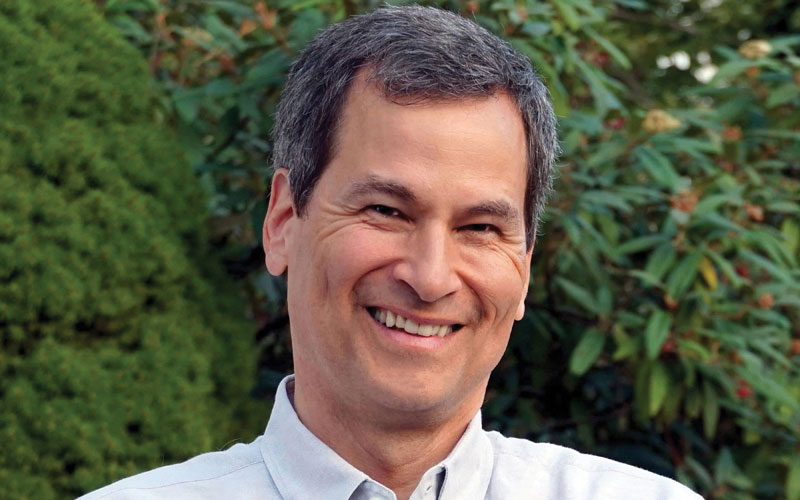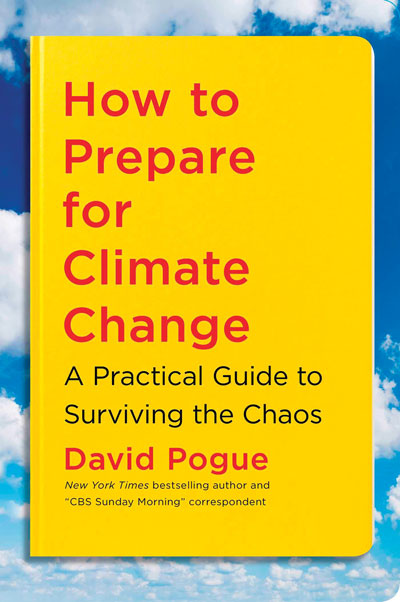Shaker native David Pogue’s latest book is How to Prepare for Climate Change. Shaker Library’s Margaret Simon interviewed him ahead of his recent talk at Shaker Heights Middle School.

David Pogue graduated from Shaker Heights High School in 1981 and summa cum laude from Yale with a distinction in music in 1985, which he put to use as a conductor for a range of Broadway musicals. His lengthy resume also includes a Loeb Award for journalism, an honorary doctorate in music, and profiles on “48 Hours” and “60 Minutes.”
Pogue may be most widely known for his writing about technology. He was a contributor to many For Dummies publications and the creator of the Missing Manual series of computer teaching books. From 2000–2013 he was the weekly tech columnist for The New York Times and wrote the Crowdwise feature for its Smarter Living section. He is a six-time Emmy winner for his stories on “CBS Sunday Morning,” and has hosted 17 science specials on “NOVA” on PBS.
Music involves science and math. Since you’re a musician who writes about science, what were your favorite subjects as a Shaker Heights High School student?
Music and science. (You saw that coming, didn’t you?) Seriously, I was a choir and theater nerd, during school hours and extracurricularly. But you’re right about music involving a lot of math and science. Not surprising that I loved physics and biology, too.
You’re known for writing how-to books. How did your idea for this book come about? How to Prepare for Climate Change is, of course, a how-to book; it just happens to be about surviving an existential planetary threat rather than troubleshooting your iPhone.
I had pitched a different book to Simon & Schuster. The director of nonfiction there, my eventual editor, said, “Sure, we’ll do that book…but we have a different book we’d like you to do first. What would you think of a book called How to Prepare for Climate Change?”
So it wasn’t even my idea. But the moment I heard it, I knew I had to write it. It’s up all my alleys: It’s how-to, it’s science, it’s explaining – and there was absolutely nothing like it on the market.
How long did you spend researching before beginning the book?
I research as I go, chapter by chapter. Overall, the book took about a year to write. It involved interviewing 55 experts – on climate, insurance, investing, child psychology, and the other subjects of the book.
 Some people don’t regard climate change as a threat. How can they be encouraged to adopt some of your ideas?
Some people don’t regard climate change as a threat. How can they be encouraged to adopt some of your ideas?
I think the number of people who don’t acknowledge the climate crisis is vanishingly small. About 25 percent of the population still believes that the changes in our weather systems – the record-breaking heat, record-breaking hurricanes, record-breaking wildfires, and so on – are part of a natural cycle rather than a result of human activity. But people who say that nothing has changed? Very, very few.
You write about go bags. What should we include in them?
What you pack in your go bag depends on the kind of threat you might experience. If you’re in California, it might be a wildfire. If you’re on the Texas coast, it might be a hurricane. But in general, you’ll want to include water purification tablets, food that’ll keep (peanut butter, packets of salmon, energy bars), change of clothes, toiletries, flashlight, first-aid kit, baby wipes, cash, copies of important documents, and so on.
Basic supplies to see you through three days away from home, long enough to get somewhere safe. Each member of the family should have one of these bags. Each person will need different things, medicine, spare glasses, whatever. Keep your go bags in a closet by the door to your home. When bad things are happening, and you have to get out, you can grab the bags and run, safe from the worry that you’re leaving home without something you’ll need. Because you’ve thought ahead, you can
toss your bag into the car and get going in five minutes.
You call our area a “climate haven.” Why?
The Great Lake states have vast, clean, reliable sources of fresh water. They won’t have to endure the blistering heat of the South. And they’re far from the coasts, so they won’t suffer from sea-level rise and hurricanes. Because they’re cooler and wetter than the West Coast, they’re even less prone to wildfires.
In other words, the Great Lakes are ideally suited to a life in the new, hotter, drier, rainier world. As a handy bonus, the cost of living is low, there’s plenty of room
to grow, and people tend to be exceptionally friendly.
When you write about car emissions, you note that car sales will be all electric by 2030. What do you drive?
I bought a Tesla Model 3 in 2018 and enjoyed $11,000 off the price, courtesy of the federal and Connecticut electric-car rebates.
Man, I love this thing. I haven’t bought gas in four years and haven’t needed any maintenance or repairs. That’s because an electric car has no transmission, spark plugs, fan belts, air filters, timing belts, or cylinder heads. It never needs emissions checks, oil changes, or tune-ups. Your brake pads and rotors go years without needing replacement.
The drivetrain of a gas car has over 2,000 moving parts. An EV’s drivetrain has 20. You can guess which one is more reliable and why service departments generally hate electric cars. Car dealerships make twice as much profit from servicing a car as they do from selling it.
What are your suggestions for teaching kids the importance of surviving the chaos of climate change without scaring them?
You don’t need to worry that telling your kids about climate change will upset them. Unless they’re very young indeed, they’re already upset. They know. They’ve picked it up from their friends and from YouTube, if they haven’t already learned about it in school. In one survey, a quarter of children ages 10 to 14 reported that they believe that the world will end during their lifetimes.
The conversations must strike a balance. Speak honestly to the kids, but without terrifying them. Your dialogue should be age-appropriate and child-appropriate.
First, explain the cause of the problem. For example: “For a long time, we’ve been burning oil and gas and coal to make energy for heating our houses, making electricity, and flying planes. But burning all that stuff makes this bad gas come out – like invisible smoke. It wraps around the planet like a blanket and makes everything warmer.”
Then outline the problem. “When the planet gets hotter, the storms get bigger, the world’s ice starts to melt, and the oceans get fuller. And pretty soon, animals have a hard time finding places to live.”
Finally, propose action and point out the positive signs. “It’s a really big problem. There are a lot of smart people working on fixing it, and there’s a lot that our family can do to help, too.”
When you’re not researching or teaching us “how to,” what do you choose to read for pleasure?
I listen to a lot of audiobooks when I’m working out or driving. All kinds of stuff: nonfiction, memoirs, fiction. I don’t have tons of time to read books on the page. For many years, I actually wrote more books than I read. But I love Ann Patchett, Andy Weir, and Trevor Noah’s memoir.
As a musician, have you ever considered writing a musical parody on climate change?
It sure would be fun to write. And for the six people who’d buy tickets to see a climate-change musical, I’m sure it’d be fun to listen to, too.



